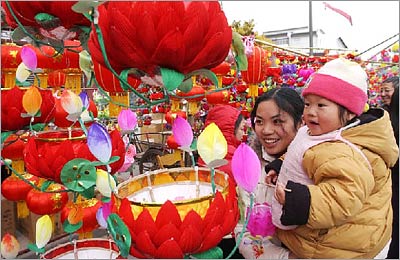Legal holidays in China are New Year (January 1st), a national one-day holiday; Spring Festival (New Year by the lunar calendar), a national three-day holiday; International Working Women's Day (March 8th); Tree Planting Day (March 12th); International Labor Day (May 1st), a national three-day holiday; Chinese Youth Festival (May 4th); International Children's Day (June 1st); Anniversary of the Founding of the Chinese People's Liberation Army (PLA) (August 1st); Teacher's Day (September 10th); and National Day (October 1st), a national three-day holiday.
China's major traditional festivals include the Spring Festival, the Lantern Festival, Pure Brightness Day, the Dragon Boat Festival, and the Mid-Autumn Festival. Ethnic minorities have also retained their own traditional festivals, including the Water Sprinkling Festival of the Dai people, the Nadam Fair of the Mongolian people, the Torch Festival of the Yi people, the Danu (Never Forget the Past) Festival of the Yao people, the Third Month Fair of the Bai people, the Antiphonal Singing Day of the Zhuang people, the Tibetan New Year and Onghor (Expecting a Good Harvest) Festival of the Tibetan people, and the Jumping Flower Festival of the Miao people.
Spring Festival
Spring Festival is the first traditional holiday of the year for Chinese people. In the past, when the Chinese people used the lunar calendar, the Spring Festival was known as the "New Year." It falls on the first day of the first lunar month, the beginning of a new year. After the Revolution of 1911, China adopted the Gregorian calendar. In order to distinguish the lunar New Year from the New Year by the Gregorian calendar, the lunar New Year was called the Spring Festival (which generally falls between the last 10 days of January and mid-February). The Eve of Spring Festival, or the lunar New Year's Eve), is an important time for family reunions. The whole family gets together for a sumptuous dinner. Some families stay up all night, "seeing the old year out." The next morning, people pay New Year calls on relatives and friends, wishing each other good luck. During Spring Festival, various traditional activities are enjoyed in many parts of China, notably lion dances, dragon lantern dances, land-boat rowing and stilt-walking.
Lantern Festival

The Lantern Festival falls on the 15th day of the first lunar month, the night of the first full moon following Spring Festival. Traditionally, people eat sweet dumplings and admire lanterns during this festival. Sweet dumplings, round balls of glutinous rice flour with a sweet filling, symbolize reunion. The tradition of admiring the lanterns emerged in the 1st century and is still popular across the country.
Pure Brightness Day
Pure Brightness Day falls around April 5th every year. Traditionally, this is an occasion for people to offer sacrifices to their ancestors. In recent years, many people have also been going to the tombs of revolutionary martyrs to pay their respects. At this time of year the weather has begun to turn warm, vegetation is bursting into new life and people love to go to the outskirts of cities to walk on the grass, fly kites and appreciate the beauty of spring. That is why Pure Brightness Day is sometimes also called "Walking amid Greenery Day."
